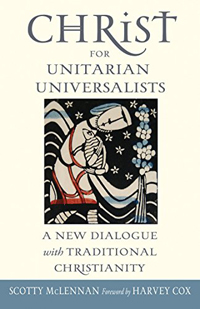 Scotty McLennan, Christ for Unitarian Universalists; A New Dialogue with Traditional Christianity (Boston: Skinner House Books, 2016), 276pp.
Scotty McLennan, Christ for Unitarian Universalists; A New Dialogue with Traditional Christianity (Boston: Skinner House Books, 2016), 276pp.
Scotty McLennan recently finished fourteen years as Dean for Religious Life at Stanford University, where today he teaches ethics and political economy at the Graduate School of Business. Before Stanford, he was the University Chaplain at Tufts for sixteen years. Back in 1975, he earned degrees at both Harvard Divinity School and Harvard Law School, was ordained as a Unitarian Universalist minister, and admitted to the Massachusetts bar, after which he spent ten years practicing church-sponsored poverty law in urban Boston. Which is to say, for over forty years now he's nurtured a passionate commitment to both religious liberalism and social justice in both the church and the academy.
In his newest book, McLennan tries to bridge the gap between UU and mainstream Christianity, to build bridges and foster a dialogue. In his conclusion, for example, he says that his aim is "to provide a fresh, twenty-first century appreciation of Christ that is compelling and personally engaging for us as Unitarian Universalists."
In some ways this feels like a tough ticket. The UU prides itself in being a "creedless" body. McLennan acknowledges that only 20% of UUs even self-identify as Christians; many others are agnostic and even atheist. So, it's not clear to me why they would or should care about an apologetic for the Christ.
In successive chapters McLennan address issues that would seem to be non-starters for a good UU — the Trinity, the resurrection, miracles, etc. But what's so important about retaining these ideas if Jesus is just one among many people who had "an elevated level of spiritual consciousness?" He interacts with a broad range of Christians — Rick Warren, John Stott, Rob Bell, NT Wright, Marcus Borg, Ann Lamott, Jaroslav Pelikan (a conservative Lutheran who converted to Orthodoxy), and others. He even has a chapter on how evangelicals and UUs should work together.
One of the strengths of the UU is its advocacy of interfaith dialogue and inclusivity. I especially appreciated McLennan's reminder about avoiding stereotypes and learning to listen. It would seem that a healthy future for any religion depends upon learning to respect and dialogue with other faiths, rather than trying to exclude, marginalize, and even kill each other. This book is a model of irenic dialogue and engagement during our American presidential election that has been marked by such violent and vulgar discourse.


